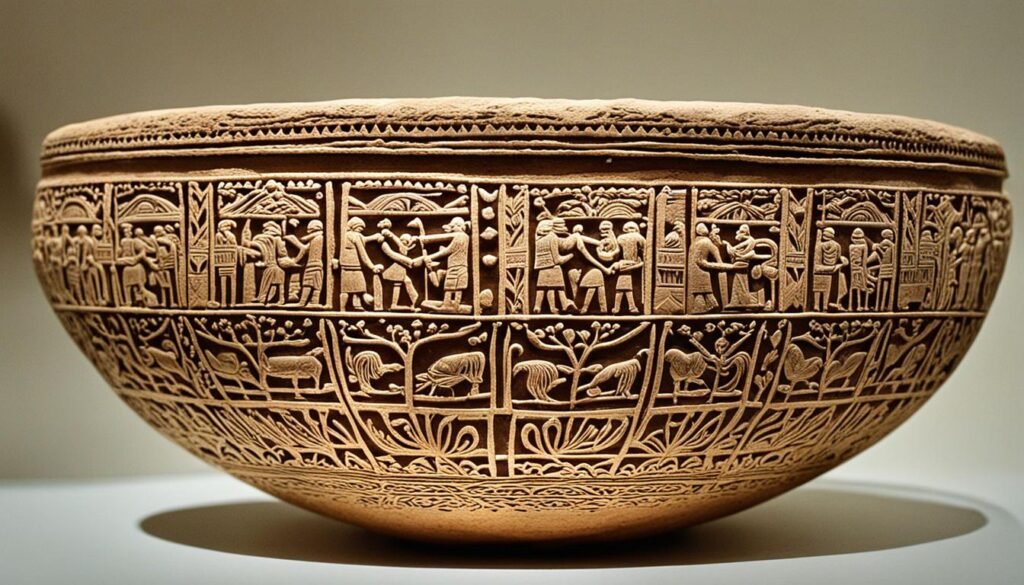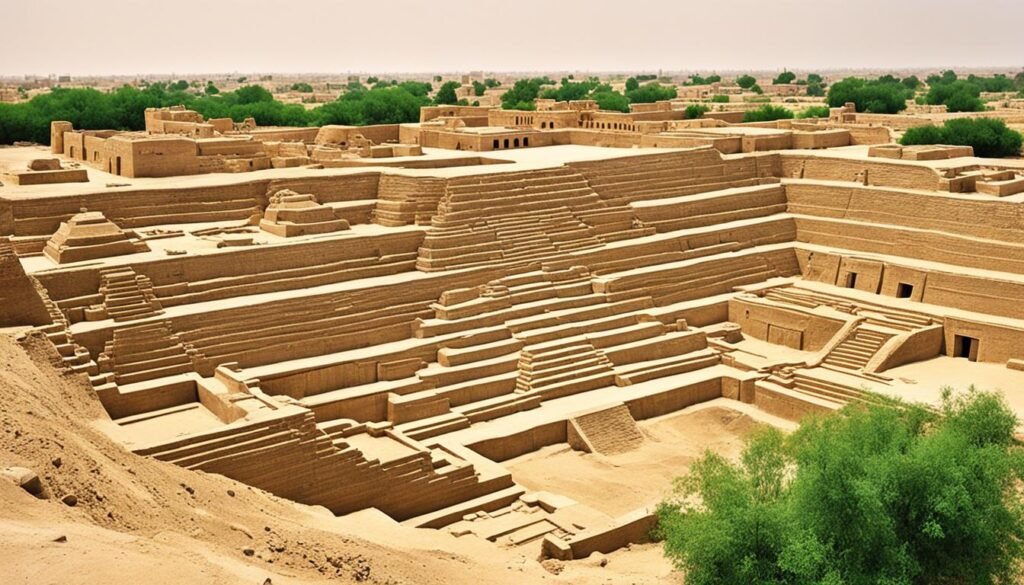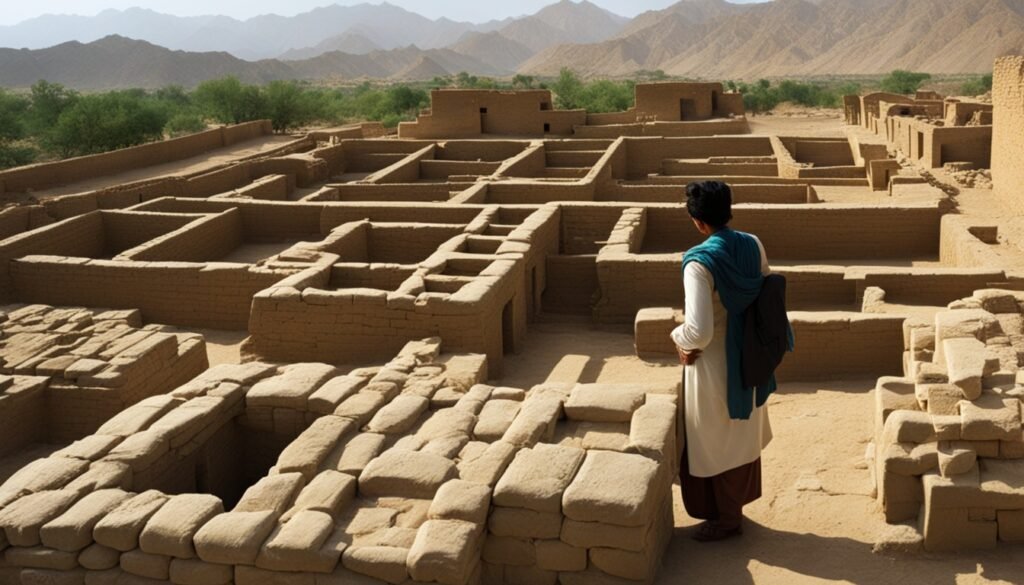Remarkably, over 4,000 years ago, the Indus Valley Civilization, one of the earliest and most advanced ancient civilizations, flourished in what is now modern-day Pakistan. Today, Karachi, the largest city and financial hub of Pakistan, has emerged as a prominent center for Indus Valley Civilization studies, with renowned institutions leading the charge in uncovering and preserving the rich cultural heritage of this region.
Key Takeaways
- Karachi, Pakistan, has become a hub for Indus Valley Civilization studies and research.
- The Indus Valley Civilization was one of the earliest and most advanced ancient civilizations, dating back over 4,000 years.
- Renowned institutions in Karachi are at the forefront of uncovering and preserving the cultural heritage of the Indus Valley region.
- Karachi’s strategic location and its diverse academic community have contributed to its emergence as a center for Indus Valley Civilization research.
- The study of the Indus Valley Civilization offers insights into the rich history and cultural traditions of South Asia.
Introduction to the Indus Valley Civilization
The Indus Valley Civilization, also known as the Harappan Civilization, is an ancient and captivating chapter in the history of the Indian subcontinent. This remarkable civilization flourished in the Indus River basin and surrounding regions during the Bronze Age, spanning from around 3300 BCE to 1300 BCE. It was one of the earliest and most advanced urban societies, boasting a sophisticated system of city planning, engineering, and extensive trade networks.
Origins and Geographic Spread
The origins of the Indus Valley Civilization can be traced back to the fertile lands of the Indus River basin, where the ancient inhabitants developed a thriving agricultural society. Over time, this civilization expanded its geographic reach, encompassing a vast region that stretched from present-day Pakistan to parts of India and Afghanistan. The archaeological sites of Mohenjo-daro and Harappa, two of the most well-known cities of the Indus Valley Civilization, have provided invaluable insights into the lives and achievements of this ancient people.
Key Archaeological Sites
The excavation and study of key archaeological sites, such as Mohenjo-daro and Harappa, have been instrumental in our understanding of the Indus Valley Civilization. These sites have revealed a highly organized urban planning system, sophisticated engineering techniques, and a thriving trade network that connected the ancient civilization to other regions of the world. The artifacts and remains discovered at these sites have shed light on the daily lives, artistic expressions, and technological advancements of the Indus Valley people, captivating historians and archaeologists alike.

The National Museum of Pakistan in Karachi
Situated in the vibrant city of Karachi, the National Museum of Pakistan is a renowned institution that houses an extensive collection of archaeological artifacts and exhibits related to the Indus Valley Civilization. Visitors to this museum can explore the advanced and sophisticated nature of this ancient civilization through a vast array of cultural relics, including pottery, seals, figurines, and other priceless treasures.
The museum’s comprehensive holdings offer a captivating glimpse into the Indus Valley Civilization, one of the oldest and most influential ancient cultures in the world. Artifacts from various Indus Valley archaeological sites, such as Mohenjo-daro and Harappa, are meticulously displayed, providing visitors with a tangible connection to the past and a deeper understanding of the region’s rich cultural heritage.

As a leading center for the study and preservation of the Indus Valley Civilization, the National Museum of Pakistan in Karachi plays a vital role in promoting awareness and appreciation of this remarkable ancient culture. Through its extensive collection and engaging exhibitions, the museum invites visitors to explore the remarkable achievements and legacy of the Indus Valley people, whose influence continues to shape the cultural landscape of Pakistan and the surrounding regions.
Pakistan: Indus Valley civilization studies Karachi Pakistan
Karachi, the vibrant cultural and economic hub of Pakistan, has emerged as a prime location for Indus Valley Civilization studies. The city is home to numerous research institutions and universities that are actively involved in the exploration and preservation of this ancient heritage. The excavations at the renowned Indus Valley sites of Mohenjo-daro and Harappa have been instrumental in uncovering the architectural, technological, and societal complexities of the Pakistan’s Indus Valley civilization.
Mohenjo-daro and Harappa Excavations
The archaeological excavations at Mohenjo-daro and Harappa, both located in the Sindh province of Pakistan, have provided invaluable insights into the Indus Valley civilization. These sites, dating back to the 3rd millennium BCE, have yielded a wealth of artifacts, architectural remains, and evidence of advanced urban planning, sanitation systems, and trade networks. The findings from these Pakistan-based excavations have significantly contributed to our understanding of this ancient civilization and its influence on the region.

Researchers and archaeologists from various institutions in Karachi, Pakistan, have been at the forefront of these excavation efforts, shedding new light on the Indus Valley civilization’s cultural, technological, and societal development. The ongoing studies and preservation work in Karachi have not only enriched our knowledge of this ancient civilization but also highlighted Pakistan’s role in the global understanding of this remarkable chapter in human history.
Sadia Salim’s Artistic Practice and Research
Sadia Salim, a prominent artist and scholar, has made significant contributions to the understanding and promotion of the Indus Valley Civilization’s cultural heritage. Her multidisciplinary art practice and research are informed by the narratives of place, lived experiences, and everyday objects. Ceramics, in particular, has become a focal point of her work, as she delves into the study of materials and techniques associated with this medium, including the traditional kashikari craft practiced in Sindh and Southern Punjab.
Multidisciplinary Approach
Sadia Salim’s artistic practice and research take a multidisciplinary approach, drawing insights from various fields such as archaeology, anthropology, and material studies. This interdisciplinary perspective allows her to explore the rich history and cultural traditions of the Indus Valley Civilization, weaving together the threads of past and present.
Ceramics and Kashikari Promotion
Salim’s fascination with ceramics has led her to investigate the intricate techniques and traditions of the kashikari craft, which has deep roots in the Indus Valley Civilization. Through her work, she aims to promote the preservation and revival of this artistic legacy, sharing her knowledge and insights with local and international audiences.
Salim has participated in various local and international conferences, residencies, exhibitions, and biennials, sharing her insights and promoting the preservation of Sindh’s cultural legacy. Her dedication to the Indus Valley Civilization’s artistic and material heritage has earned her recognition as a leading voice in the field of Pakistani art and research.
Interdisciplinary Graduate Programs at IVS
The Indus Valley School of Art and Architecture (IVS) in Karachi has emerged as a leading institution in the study of the Indus Valley Civilization. Recognizing the multifaceted nature of this ancient culture, IVS has established the first interdisciplinary graduate program dedicated to exploring its rich heritage. Sadia Salim, a renowned artist and scholar, served as the founding director of this pioneering program from 2018 to 2021, bringing her expertise and vision to the institution.
The graduate program at IVS offers students the opportunity to delve into the Indus Valley Civilization from diverse academic perspectives. By integrating disciplines such as archaeology, history, art, and architecture, the curriculum fosters a comprehensive understanding of this captivating ancient civilization and its lasting influence on the region.

Through a blend of rigorous coursework, hands-on research, and collaborative projects, students at IVS are equipped to explore the Indus Valley Civilization from multiple angles. This interdisciplinary approach encourages critical thinking, cross-disciplinary collaboration, and a deeper appreciation for the complexities of this remarkable cultural legacy.
The Indus Valley School of Art and Architecture’s graduate program serves as a vital hub for the study and preservation of the Indus Valley Civilization, attracting scholars and enthusiasts from around the world to engage with this enduring chapter of South Asian history.
International Exhibitions and Residencies
The Indus Valley Civilization’s enduring legacy has captivated global attention, leading to a surge of international exhibitions and artist residencies that showcase the region’s rich cultural heritage. Pakistani artists and scholars have participated in prestigious events and programs, sharing their expertise and promoting the influence of the Indus Valley Civilization on the cultural landscape.
One such initiative is the Karachi Biennale, a renowned international art exhibition that has featured works inspired by the Indus Valley Civilization. Additionally, the Lahore Biennale has provided a platform for Pakistani artists to engage in cultural exchange and explore the lasting impact of this ancient civilization. Beyond these local platforms, Pakistani creatives have also been invited to prestigious artist residencies, such as those at the Künstlerhaus Stadttöpferei Neumunster in Germany, the Mark Rothko Centre in Latvia, and the University of Johannesburg in South Africa.
These collaborative endeavors have facilitated the sharing of knowledge and the celebration of the Indus Valley Civilization’s influence on contemporary art and scholarship. By participating in these international exhibitions and residencies, Pakistani artists and researchers have not only heightened global awareness of this remarkable civilization but also forged meaningful cultural exchange and understanding.
Preserving and Promoting Sindh’s Cultural Heritage
Recognizing the importance of safeguarding and promoting Sindh’s rich cultural heritage, including the enduring legacy of the Indus Valley Civilization, various initiatives and collaborations have emerged in the vibrant city of Karachi. Organizations like Pursukoon Karachi, a collective founded by Sadia Salim, have been at the forefront of these efforts, actively engaging the public through artistic events and programs designed to raise awareness and foster appreciation for the region’s captivating history.
Collaborations and Public Engagement
These collaborative endeavors aim to celebrate the Indus Valley Civilization’s timeless influence and inspire a deeper understanding of Sindh’s historical significance. By bringing together artists, scholars, and the wider community, these initiatives have created platforms for the exploration and preservation of Sindh’s cultural treasures. Through thought-provoking exhibitions, interactive workshops, and public outreach, they strive to ignite a sense of pride and stewardship among the people of Sindh, ensuring that the region’s invaluable heritage is safeguarded for generations to come.
The collaborative efforts in Karachi underscore the importance of public engagement in the preservation and promotion of Sindh’s cultural identity. By fostering connections between diverse stakeholders, these initiatives have empowered the local community to actively participate in the safeguarding of their ancestral traditions and artistic expressions. This holistic approach to cultural preservation has the potential to inspire a renewed sense of appreciation and ownership, ultimately strengthening the bond between the people of Sindh and their rich, centuries-old cultural legacy.
Conclusion
Karachi, the vibrant and dynamic city of Pakistan, has emerged as a hub for Indus Valley Civilization studies, research, and cultural preservation. Renowned institutions, such as the National Museum of Pakistan and the Indus Valley School of Art and Architecture, have been at the forefront of these efforts, leading the charge in uncovering, studying, and promoting the rich heritage of this ancient civilization.
Through interdisciplinary graduate programs, international collaborations, and public engagement initiatives, Karachi has become a center of excellence for Indus Valley Civilization studies, inspiring a deeper appreciation and understanding of this remarkable chapter in South Asian history. The city’s commitment to preserving and promoting the cultural legacy of the Indus Valley Civilization is a testament to its unwavering dedication to safeguarding the past and shaping a future that celebrates the enduring significance of this remarkable ancient civilization.
As the world continues to explore the mysteries and wonders of the Indus Valley Civilization, Karachi’s role as a hub for research, education, and cultural preservation will undoubtedly continue to grow, solidifying its place as a leading light in the study of this captivating and influential civilization.
Source Links
- Home – IVS – https://www.indusvalley.edu.pk/
- Log into Facebook – https://www.facebook.com/indusvalley/
- An Introduction to Harappan Mirrors: Studies in the National Museum, Karachi, Pakistan – https://jac.qau.edu.pk/index.php/jac/article/view/134


